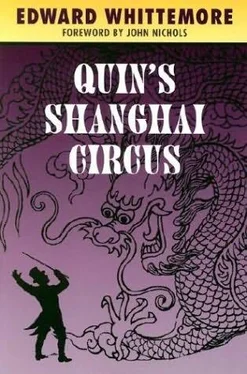Edward Whittemore - Quin’s Shanghai Circus
Здесь есть возможность читать онлайн «Edward Whittemore - Quin’s Shanghai Circus» весь текст электронной книги совершенно бесплатно (целиком полную версию без сокращений). В некоторых случаях можно слушать аудио, скачать через торрент в формате fb2 и присутствует краткое содержание. Жанр: Фэнтези, на английском языке. Описание произведения, (предисловие) а так же отзывы посетителей доступны на портале библиотеки ЛибКат.
- Название:Quin’s Shanghai Circus
- Автор:
- Жанр:
- Год:неизвестен
- ISBN:нет данных
- Рейтинг книги:3 / 5. Голосов: 1
-
Избранное:Добавить в избранное
- Отзывы:
-
Ваша оценка:
- 60
- 1
- 2
- 3
- 4
- 5
Quin’s Shanghai Circus: краткое содержание, описание и аннотация
Предлагаем к чтению аннотацию, описание, краткое содержание или предисловие (зависит от того, что написал сам автор книги «Quin’s Shanghai Circus»). Если вы не нашли необходимую информацию о книге — напишите в комментариях, мы постараемся отыскать её.
Quin’s Shanghai Circus — читать онлайн бесплатно полную книгу (весь текст) целиком
Ниже представлен текст книги, разбитый по страницам. Система сохранения места последней прочитанной страницы, позволяет с удобством читать онлайн бесплатно книгу «Quin’s Shanghai Circus», без необходимости каждый раз заново искать на чём Вы остановились. Поставьте закладку, и сможете в любой момент перейти на страницу, на которой закончили чтение.
Интервал:
Закладка:
He caught Geraty full in the face. Geraty went over, toppled backward, sprawled on his back across the terrace. Blood ran from his nose and mouth. Quin took a handkerchief out of his pocket and wrapped it around his hand. He was shaking.
Like it, buffalo? Feel right? That was for a guy with a gimp leg who tried to make it and went crazy and a woman who tried to make it and took a high dive. And a broken-down Jesuit and a girl who was working as a whore as a kid and your fucking Marco Polo and your fucking Elijah and all those other poor fucking ticket-buyers who were trying to do something, anything, what does it matter, while you were loping around the edges of the circus whacked out on booze and horseradish, doing your jackal number on booze and horseradish, sneezing and scratching and whacked out in your damn fake costumes playing the impostor. But most of all, buffalo, it’s for Little Gobi, let’s call him that, not Big but Little, a guy who never tried to do anything at all and never hurt anyone. Those are people you’re talking about, don’t you know that? So she was conceited and hysterical and he thought he was going to be a hero, so fucking what? What the hell do you think you’ve done with your life? The gimp finds out he’s not a hero and his woman finds out she’s made a mess of it, the General tries and gets strung out and Lamereaux tries and gets strung out, and Little Gobi does nothing at all and gets his head knocked in and what the hell are you doing all that time? You didn’t do what Lamereaux did or what the General did or the gimp and his woman, you just sat on your ass doing nothing, not trying, doing nothing at all. You make me sick, buffalo. You and your shit. You and your liar’s dice. You and your arrogance and your stench and your fat ass and your speeches and your saints and your lies. You talk about other people after the way you’ve lived? Sitting on top of that kind of garbage? Just where do you get off thinking you can do something like that? Who the fuck do you think you are, going around faking everything in sight? A clown playing God?
Geraty, flat on his back, hiccuped. He licked his lips and rubbed the blood off his nose. He tried to raise himself on an elbow.
Quin spat on him.
Say it, you slobbering fat man. Say it.
No.
No what?
Nothing.
What do you mean, nothing?
I’m sorry, nephew. I’m sorry about that.
You’re damn right you’re sorry. You’re the sorriest bag of secret shit I’ve ever seen.
No, that’s not it, nephew. You don’t understand. I’m not sorry that way, I’m sorry you can’t have an answer. I’m sorry your questions don’t make any sense.
What the hell, you must have something to say for yourself.
No.
Nothing?
Nothing.
What do you mean, nothing ? Nothing at all? Just nothing? You live sixty-five years and you’re noplace? You’ve got nothing to say? Not a damn thing?
No.
Why the fuck not?
Because a toad and a uterus have the same shape. It’s too early now, but when you’re a little older take a look at the skin on the back of your hands. Take a look at the pan of gray water after you wash your hair.
What are you trying to say, buffalo?
I’ll tell you. First I have something to give you.
Geraty groaned. He pulled in his arms and legs, struggled to get to his feet. A moment later he was lumbering into the house and returning with a black bowler hat. He handed it to Quin, who spun around and scaled it out over the sea. The hat rose on a gust of wind, stopped, slipped down the cliff to the waves with a swarm of seagulls chasing it. Quin rocked back and forth nodding to himself.
Sit down, ordered Geraty.
What?
I said sit down.
Quin sat down. His hand hurt. He was still shaking, but what bothered him most was that Geraty had remained so calm. His uncle jerked his thumb over his shoulder.
That’s a fishing village.
I know what the hell it is.
You do, do you? Then you know O-bon . You know Nichiren.
Quin said nothing.
What? Do you?
No.
You mean you didn’t learn everything there was to know in that Bronx bar of yours? Well, listen to me then. Fishing nets are spread and mended, storms and tides come and go. That’s the way it is here most of the year, that’s all people think about because that’s all they have to think about. But once a year it’s different. In midsummer there’s a day known as O-bon , the Festival of the Dead, a time of the moon when ghosts come back to the world they knew. The villagers welcome them with rice and sake , they rejoice, for the ghosts are lost friends and relatives. They talk together, reminisce, the day passes. All goes well until nightfall and then not a light shows in the village. Why? Because the ghosts are in that darkness. They’re there and they want to stay there. They don’t want to leave.
The villagers gather on the shore. The young men raise the shrine on their backs and carry it out into the water. The old men launch small paper boats and set them afire, set them adrift so they can carry away the restless memories.
The shrine begins to shake violently. The spirits have turned away from the flimsy craft they have been offered. They would rather linger in the village, in the darkness of the homes they once knew as their own. Not willingly will they submit themselves again to the deep.
In front of the shrine stands a man immersed in water to his chest, an intercessor who must face the sea and demand a domain for the living with a voice that can overcome the dirge of ten thousand suffering souls. This voice must be stronger than the wails of the dead, louder than the wind, more insistent than the wishes of all the ghosts ever known to the men and women of this village. He must find that voice and speak with it, and when he does it must prevail.
Geraty spread wide his arms. He fixed his gaze on a seagull suspended in the air. A powerful, monotonous chant rose from the terrace, an unintelligible Buddhist incantation that steadily gathered in force and rhythm. The pines creaked, the breakers hummed. Abruptly the chant ended and the seagull broke free on the wind.
Geraty dropped his arms to his sides.
What is done is undone, he whispered. The shrine no longer trembles on the backs of the young men. The burning boats cast adrift by the old men float away on the dark waters. The dead sleep, the living set their sails and fish their seas. The dangerous rite is over.
And Nichiren? An unknown monk who lived in the thirteenth century. Who lived alone and unnoticed in a corner of these islands at a time when a Prince of princes ruled in Asia, a Prince of all the tribes, a warrior horseman so fearless and unbending his was the will of the desert itself.
One day the Prince surveyed his empire and decided these few small islands off the coast of Asia should be conquered, not because they would enrich him but for the sake of the symmetry of his maps.
So Kublai Khan commanded that a fleet be built, a fleet to carry one hundred thousand of his finest horsemen. Who but a man of the desert would build the greatest fleet in history for the sake of symmetry?
In Japan there is no hope of combating the army of the largest empire the world has ever known. The Emperor retires to compose a poem, his Generals polish their swords and dictate love letters. Rice dealers bury gold, peasants give birth and die, ladies sigh over their wardrobes.
A nameless monk tirelessly trudges the dusty road toward the south, toward the shore where the unconquerable Khan’s horsemen will begin their conquest.
The afternoon comes when the fleet appears on the horizon. Briefly the Japanese forces group and regroup before scattering. The Generals honorably commit suicide. The Emperor observes sunset from his temple in the mountains. Fires and looting break out in the capital. The shoreline is deserted. For many miles inland the countryside is deserted.
Читать дальшеИнтервал:
Закладка:
Похожие книги на «Quin’s Shanghai Circus»
Представляем Вашему вниманию похожие книги на «Quin’s Shanghai Circus» списком для выбора. Мы отобрали схожую по названию и смыслу литературу в надежде предоставить читателям больше вариантов отыскать новые, интересные, ещё непрочитанные произведения.
Обсуждение, отзывы о книге «Quin’s Shanghai Circus» и просто собственные мнения читателей. Оставьте ваши комментарии, напишите, что Вы думаете о произведении, его смысле или главных героях. Укажите что конкретно понравилось, а что нет, и почему Вы так считаете.












